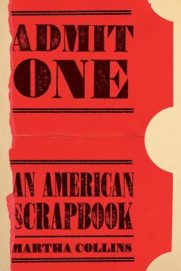 Martha Collins
Martha Collins
University of Pittsburgh Press ($15.95)
by Edward A. Dougherty
Beginning with the 1904 World’s Fair in St. Louis and proceeding chronologically, Martha Collins’s new book Admit One relentlessly pushes against any sense that we live in a post-racial America. Slowly, inexorably, the supports are removed from any idea that “those kinds of things” happened back then or over there, to people not like us or by people not like us. Five poems in the “Postscript” section hurtle through the remaining decades and into our time, the current presidential election rhetoric echoing painfully right alongside.
The “Fair” section starts as reportage about what was there (including footnotes on their current locations) and who was there: Thomas Wolfe, Thomas Edison, Kate Chopin, and “My mother’s mother and father.” The inclusion of the autobiographical detail seems anti-lyrical—it’s presented as if it were not personal, but of course it is, and yet it lacks the resonance of feeling. This mood complements the narrative in Collins’s previous books Blue Front and White Papers, and it demonstrates how we all relate to such histories. Failing to admit this makes larger admissions more difficult. Amid information on the Fair, we learn that “people had been brought . . . to be displayed” and this introduces us to the first concept to be interrogated: the division and difference between “civilized” and “primitive.” It is just one of the distinctions the book explores between “human” and animal, savage, defective, or unfit. Once we can conceptualize that difference, all hell can break loose.
To stake out the tensions inherent in such a big project, Collins has devised a poem form, a kind of gloss: An individual word pairing operates as the title, then the body employs individual words or phrases to present and investigate its many meanings and uses. For example, “Fair / Fair / Fare” includes the festival but also “doesn’t play fair” and ends with “fare / well to be bought and sold.” In this way, Collins pauses the narrative of each section and allows the language we use to reveal values and contradictions. She does this with “Animal / Anima” by observing that anima means to breathe, and so “all animals / breathe the same.” In “Missing / Missing” she includes the sense of something lost and the longing for it, but ends by asserting that “we are the missing link” to complicate that section’s scientific theories.
Admit One tightens around a cluster of concepts based in biological formulations of race and Social Darwinism; this cluster centers around three words: eugenics, miscegenation, and sterilization. The eugenics movement gave rise to the “Better Baby Contests.” Defining who or what is the “wrong type” leads directly to Teddy Roosevelt’s conclusion that “We have no business to permit the perpetuating of citizens of the wrong type,” which led to keeping races from mixing and to sterilization. It became the life’s work of men such as Madison Grant to forge the links in this logical chain, and according to Collins, his book The Passing of the Great Race earned the praise of Adolf Hitler, who said, “The book is my Bible.”
Hitler is not a passing reference. This cluster of concepts was embedded in American culture, from State Fairs (where better babies were measured), to Henry Ford’s Detroit, to Woodrow Wilson’s White House, and to Oliver Wendell Holmes’ Supreme Court. It was “science” and it made policy. It shaped immigration laws, laws in the majority of states banning inter-racial marriage, and compulsory sterilization laws. And so the progression from the Fair to Zoo to the KKK and the Nazis is something we all have to admit. At least that.
Collins artfully personalizes these progressions by introducing us to the lives of several particular people. One of these, Ota Bengo, was brought to America to be displayed at the 1904 World’s Fair, but he was later displayed at the Museum of Natural History before moving to the Bronx Zoo, where he was shown in the Primate House, a zoo designed by Madison Grant. To contrast this aspect of his story, Collins writes that “In April 2014, seven / chimpanzees escaped / from the Kansas City Zoo,” underscoring that animals demonstrate the intelligence and longing for freedom we typically only assign to humans (as if we were not animals).
Admit One concludes the trilogy Collins began with Blue Front and White Papers. Each book attacks the ideas and implications of race, and each employs intelligent precision of language, of sources, and of construction. Some smart publisher should gather these three books into a single volume—Collins’s “race trilogy” would be perfect for any social science teacher, creative writing instructor, or history professor to use in the classroom, and it constitutes a remarkably readable poetic opus that any reader will want to pass along to others, just to discuss it.
